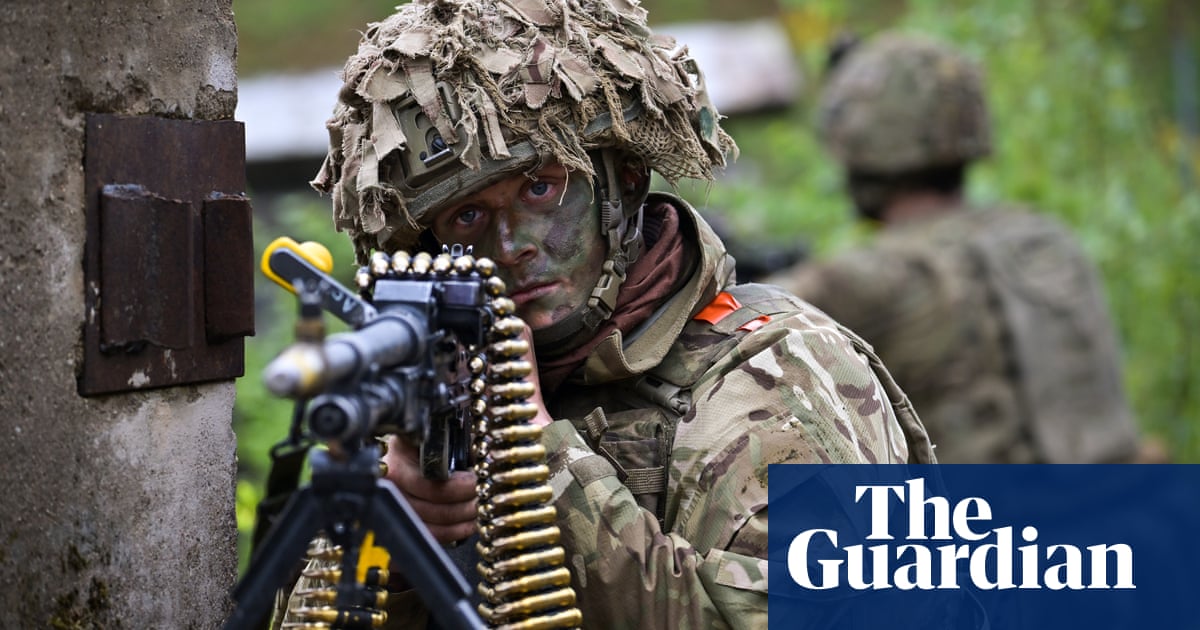The people of the UK are part of a “prewar generation” who must be prepared to fight a major war against Vladimir Putin’s increasingly aggressive Russia if necessary, the head of the army argued in a speech on Wednesday.
Gen Sir Patrick Sanders said ordinary citizens would be forced to reinforce the UK’s small military – although in a clarification the Ministry of Defence said it was not calling for a return to peacetime conscription, which was abolished in 1960.
The senior soldier’s intervention comes as army numbers have been declining to their lowest levels for more than 300 years and amid persistent reports of tensions between the British army and the Ministry of Defence over future spending.
Sanders highlighted the example of Sweden, which has just reintroduced a form of national service as it closes in on joining Nato, in a speech given to a military conference in Twickenham, south-west London.
The army chief said the UK needed to broadly follow Stockholm’s example and take “preparatory steps to enable placing our societies on a war footing”. Such action was “not merely desirable, but essential”, he added.
The foundations for “national mobilisation” could not be confined to countries neighbouring or close to Russia, and as a result ordinary people in the UK would be forced to join the UK’s 74,110 full-time regular army to see off an active threat to mainland Europe.
“We will not be immune and as the prewar generation we must similarly prepare – and that is a whole-of-nation undertaking. Ukraine brutally illustrates that regular armies start wars; citizen armies win them,” he said.
Sanders, who is due to retire from the army in July, has complained in the past about cuts. A year ago, in an attempt to ensure politicians plugged the gap with future spending, he warned that gifts of weapons to Ukraine would “leave us temporarily weaker”.
But such public arguments over money have led him into conflict with the Ministry of Defence, amid reports of clashes with the chief of defence staff, Adm Sir Tony Radakin. Some allies believe Sanders should have been promoted to replace Radakin, but he was asked to step down early after serving two out of three years as army chief.
In his speech, Sanders said the cold war peace dividend was over, noting that “over the last 30 years, the army has been halved in size; in the last 12 years, we’ve absorbed a 28% reduction”. Recruitment remained a challenge, he acknowledged, although applications to join were “the highest in six years”.
Sanders’s speech was released by the army, not the Ministry of Defence. The Whitehall department released its own clarifying statement in the morning, emphasising that a return to national service was not being advocated.
“The British military has a proud tradition of being a voluntary force and there is absolutely no suggestion of a return to conscription,” the MoD said, adding that £50bn was being invested in the military during the current year.
after newsletter promotion
With an election looming, the military is looking to politicians to make further pledges over defence spending.
Labour has avoided making a firm spending commitment, but it has complained about cuts to the size of the army and has promised to launch a defence review if it is elected.
Grant Shapps, the defence secretary, earlier this month repeated that the UK wants to increase defence spending from 2.1% of GDP to 2.5% at some point in the future.
But Sanders said: “The army has a generous £44bn programme over 10 years, but that money is just 18% committed. During an electoral cycle, uncommitted money is vulnerable.”

William Turner is a seasoned U.K. correspondent with a deep understanding of domestic affairs. With a passion for British politics and culture, he provides insightful analysis and comprehensive coverage of events within the United Kingdom.







